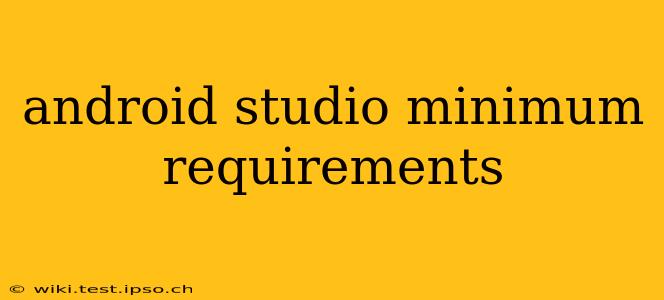Android Studio Minimum Requirements: A Comprehensive Guide
Developing Android apps requires the right tools, and Android Studio is the official Integrated Development Environment (IDE) for the job. Knowing the minimum system requirements is crucial before you begin your Android development journey. This guide outlines the minimum specifications and provides additional insights to ensure a smooth and efficient development experience.
While Android Studio can run on systems meeting the minimum requirements, a smoother workflow and better performance are achieved with more powerful hardware. We'll cover both minimum and recommended specs.
What are the Minimum System Requirements for Android Studio?
The official minimum requirements for Android Studio are subject to change with updates. However, as of late 2023, the generally accepted minimum specifications are:
-
Operating System: Windows 7 (64-bit) or higher, macOS 10.14 (Mojave) or higher, or Linux. Note that support for older operating systems may be discontinued with future Android Studio releases. It's best to use a supported OS version for optimal performance and bug fixes.
-
Memory (RAM): 8 GB minimum. While technically functional, 8GB of RAM will push your system to its limits, especially with larger projects and running emulators.
-
Disk Space: At least 8 GB of free space. This doesn't account for the size of your projects, which can quickly grow to consume significant storage. Plan for substantially more free space, especially if you are working on multiple projects simultaneously.
-
Processor: A relatively modern processor (Intel Pentium 4 or AMD Opteron or equivalent). While this is the minimum, a multi-core processor is strongly recommended for better performance.
-
Java Development Kit (JDK): Android Studio requires a JDK. You'll need to download and install a compatible version; Android Studio usually guides you through this process during installation.
-
Other: A stable internet connection is also needed for downloading and updating components.
What are the Recommended System Requirements for Android Studio?
For a more optimal development experience and faster build times, consider these recommended specifications:
-
Operating System: Latest version of Windows 10 (64-bit) or higher, macOS, or a supported Linux distribution.
-
Memory (RAM): 16 GB RAM or more. This will significantly reduce lag and improve responsiveness.
-
Disk Space: At least 20 GB of free space, or more depending on your project size and other applications installed. Using an SSD (Solid State Drive) is highly recommended for faster loading times.
-
Processor: A modern multi-core processor. Intel Core i5 or AMD Ryzen 5 or higher is ideal.
-
Graphics Card: A dedicated graphics card is beneficial, particularly if you frequently use the Android Emulator.
How much RAM does Android Studio actually need? Will 8GB be enough?
8GB is the absolute minimum, but it's unlikely to provide a smooth workflow. Expect frequent slowdowns, especially when working on larger projects, using the emulator, or running background tasks. You'll likely find your system frequently swapping memory to the hard drive, resulting in noticeable performance bottlenecks. 16GB of RAM is strongly recommended for a responsive and productive Android development environment.
What if my system doesn't meet the minimum requirements?
If your system falls short of the minimum requirements, you're likely to encounter frequent crashes, slowdowns, and an overall frustrating development experience. Consider upgrading your hardware, particularly RAM, before proceeding. Trying to work within these constraints will be significantly challenging.
Can I run Android Studio on a Chromebook?
Android Studio is not officially supported on Chromebooks in the way that it is on Windows, macOS, and Linux. While you might be able to run it using a virtual machine (like VMware or VirtualBox), this would significantly impact performance, particularly given the likely lower processing power and memory of a typical Chromebook. This approach is strongly discouraged unless you have a very high-end Chromebook with substantial resources.
This comprehensive guide provides a clear understanding of the minimum and recommended requirements for running Android Studio efficiently. Remember, investing in sufficient hardware will significantly enhance your overall development experience.
